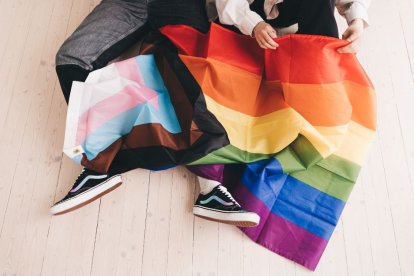Inclusion or imposition? Cartoons as an LGBT tool to indoctrinate children
"Sesame Street," "We Baby Bears" and "Looney Tunes" aired the LGBT agenda in some of their episodes to celebrate Pride Month.

(Pexels)
The LGBT agenda is gaining steam. Far from celebrating the movement only with parades, many companies are increasingly joining the movement and leading initiatives that are received with varying degrees of success by the public. Not only companies, TV shows and movies aimed at children are also becoming more and more encouraged to indoctrinate their audiences with LGBT initiatives.
The first to adopt this was "Sesame Street." The children's series began to publicize the movement years ago, and it is a tradition that it has maintained to this day. During this year, the show made not one, but three initiatives to show its support during Pride Month.
Their first idea was to use their social media to announce that, like many, they were also joining in the celebration of Pride Month. They did so by publishing an image with several characters from children's show shaking hands and recreating, with their colors, the rainbow flag. The composition came accompanied by the following message:
The tweet, as in many other cases, sowed controversy, and many parents complained that, once again, a children's show was indoctrinating their children with the LGBT agenda. However, "Sesame Street," far from stopping, launched another initiative. It came in the form of a video. In it, Elmo, the beloved character from the series, accompanied by actress Ariana DeBose, wished a "Happy Pride Month" to the entire audience:
Since then, throughout the month, the popular children's show, owned by the public network PBS, has been posting messages making its support for the LGBT agenda clear, generating the dissatisfaction of several parents who do not welcome the discussion of these issues in a program aimed at the youngest members of the family:
Bugs Bunny dresses up to celebrate Pride Month
Bugs Bunny was another cartoon that also decided to join the Pride Month celebration. The animated show "Looney Tunes," owned by Warner Bros., published a tweet in which the rabbit, dressed as a woman, invited kids to "get your drag on":
The post was soon filled with replies from other companies showing their support for the LGBT agenda. Phrases such as "a serve every time" or "he looks fabulous" were posted by Fuse.Tv or Maxwell, among others, in response to the image.
Citizens also commented on the post, although they did so as a criticism of the decision adopted by the popular cartoon program, which they accused of inculcating a gender ideology in children:
'We Baby Bears' airs its first "LGBT-inclusive episode"
Cartoon Network also decided to dive headfirst into the politics of gender ideology. In this case, they did so by airing an "inclusive episode" in the series targeted towards 6-year-olds, "We Baby Bears." It happened during the "Polly's New Crew" episode. There, the children saw firsthand how some of Polly the Pirate Captain's friends come to her aid after she ends up suffering from a pirate curse.
Controversy arose when two new characters were introduced who would help Polly, making it clear which pronouns they use: "I am the great Winnifred, she/her. Actor extraordinaire!" assures one of them while another character, a bear, is busy introducing the second non-binary character: "Our crew also has a new addition. Meet Box! They use they/them pronouns and they make an exceptionally good quiche!" to which Polly the Pirate Captain replied "I use they/them pronouns as well!"
The episode was denounced by the Libs of TikTok account. In a tweet, the account assured that "they're after your kids," setting a new example of how cartoons, whose main function should be to entertain kids, are now indoctrinating children.
Netflix's non-binary bison
One of the first children's series that decided to feature a non-binary character was "Netflix's Ridley Jones." It happened during his eighth episode of the fifth season. Titled "Happy Herd Day," the episode served to introduce Winifred, a bison who defined herself as non-binary.
The animal identified with this gender while having a conversation with her grandmother Dottie, voiced by singer Cyndi Lauper, and confessed that it preferred to be called Fred. In addition, she claimed that she used "they/them pronouns" because "referring to me as 'she' or 'he' does not define how I identify myself."
The scene continued with Grandma encouraging Fred to show her true self, for, she assured in a plaintive tone, the little bison would be unable to lead the herd if she did not accept herself as she is:
The scene, as happened with the other children's series, sparked anger among Twitter users and many people who use the streaming platform said they would cancel their subscriptions:
Pixar joins the LGBT trend and introduces its first non-binary character
Pixar, the company that brought movies like "Toy Story" or "Cars," also joined the initiative and introduced its first non-binary character. Lake Ripple, Wade's brother in "Elemental," thus became a new representative of the LGBT agenda. It was its voice actor, Kai Ava Hauser, also a transgender person who broke the news:
The box office, however, does not seem to support this forced inclusion that Pixar adopted. Like "Lightyear," "Elemental" flopped, grossing only $29.5 million in its first weekend. It thus became the lowest-earning opening weekend in the Pixar's history, as reported by The New York Times.












